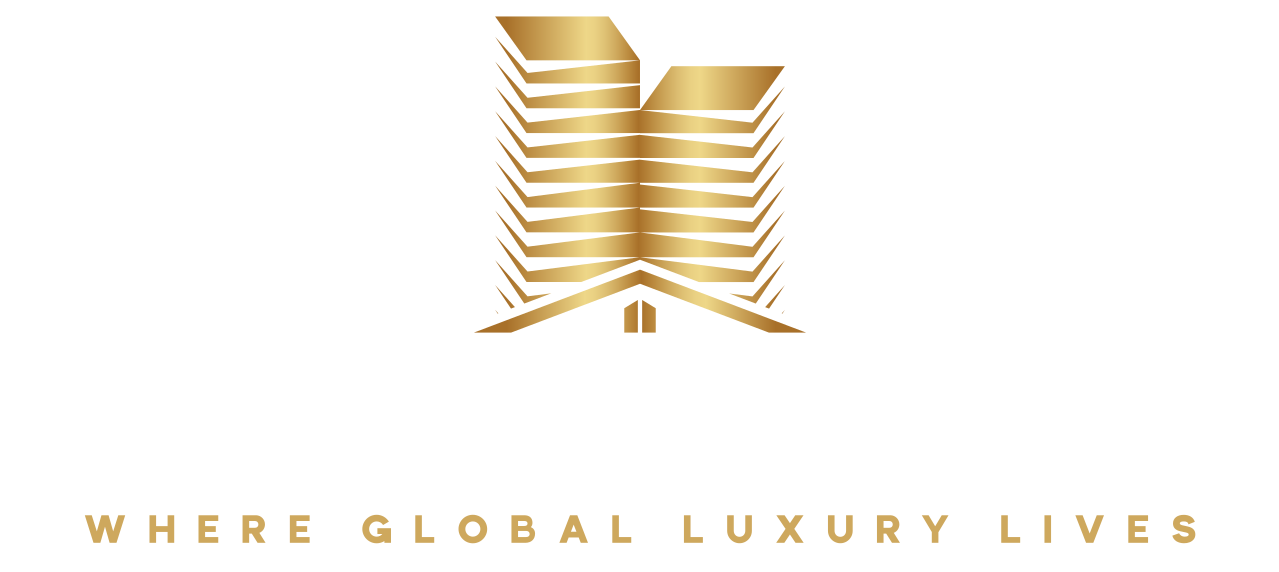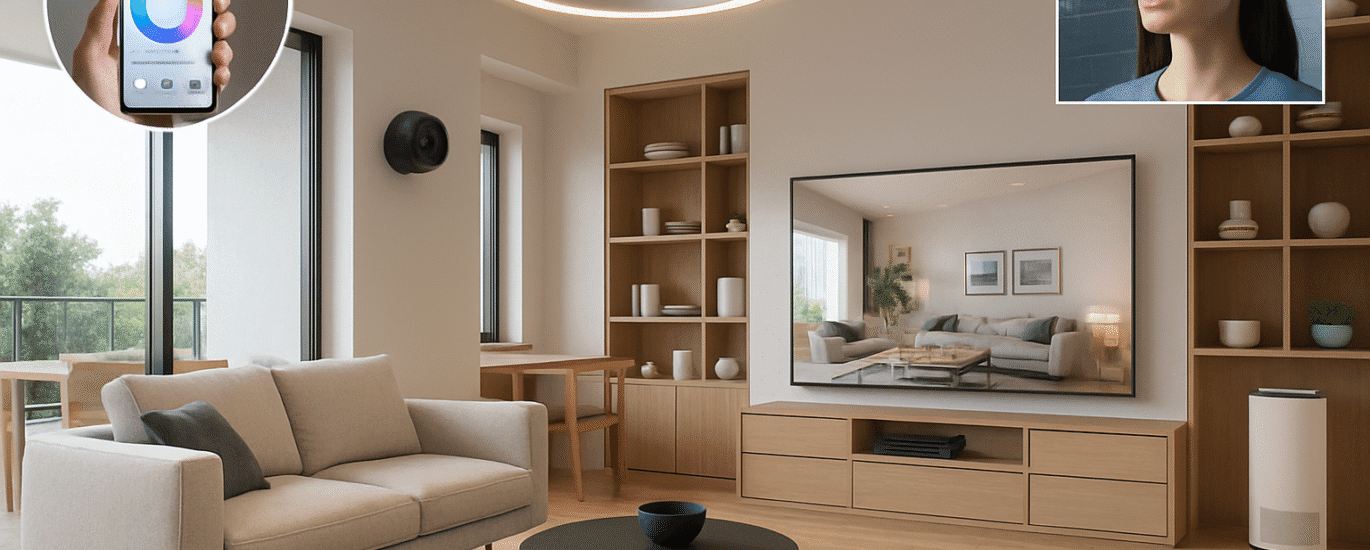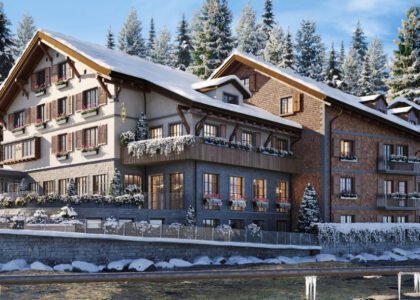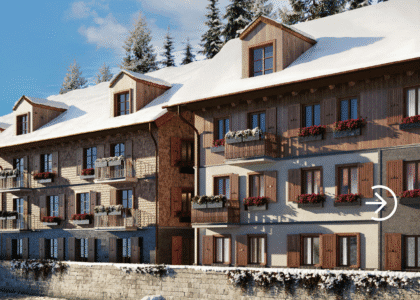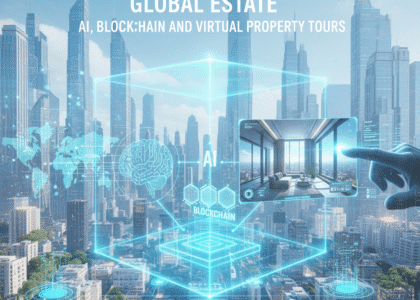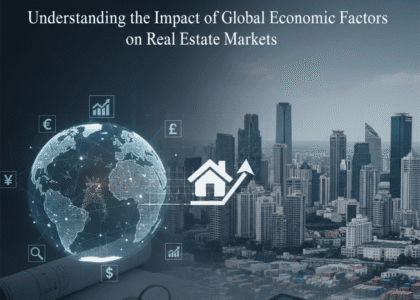Introduction: Embracing a New Era of Smart Living
Why 2025 Is a Pivotal Year for Smart Homes
It’s no longer science fiction. In 2025, smart living isn’t just a futuristic dream — it’s today’s reality. With explosive growth in smart technology and IoT (Internet of Things), luxury homeowners are now demanding homes that can think, respond, and evolve. Gone are the days when innovation was a mere selling point; now, it’s a necessity for those investing in luxury homes for sale or browsing international luxury properties.
Smart homes have transitioned from gimmicks to full-scale ecosystems that manage lighting, temperature, security, entertainment, and even ambience. What makes 2025 unique is the level of integration. Every device is now part of a harmonious whole — designed to make life easier, more efficient, and tailored to personal preferences. From AI-controlled assistants that greet you with your morning routine to solar-powered energy systems that drastically cut carbon footprints, the smart home of 2025 is a lifestyle revolution.
The Shift from Traditional to Smart Luxury Living
Luxury real estate has always been about elegance, comfort, and prestige. But in 2025, the definition of luxury property investments has expanded to include intelligence. Traditional features like granite countertops and spa-like bathrooms are now joined by automated blinds, biometric access, and adaptive lighting systems.
High-net-worth individuals (HNWIs) are no longer just looking for opulence — they seek premium real estate services that understand the nuances of integrating high-tech solutions with high-end aesthetics. Buyers are increasingly prioritising properties that offer full automation, seamless control via smartphones or voice, and energy efficiency. This evolution is driven by both convenience and sustainability, aligning well with modern values without compromising on luxury.
Smart Lighting and Energy-Efficient Solutions
Adaptive Lighting for Mood and Productivity
Imagine walking into a room and the lighting automatically adjusts to match your mood or activity. That’s the standard in 2025. Smart lighting systems now come equipped with AI that recognises usage patterns and adjusts brightness and colour temperature accordingly. For instance, warmer tones during evening hours to wind down, and cool white tones during work sessions to enhance concentration.
This feature is especially appealing to professionals who work from home or those who entertain guests regularly. Adaptive lighting not only enhances the aesthetic of a luxury apartment for sale but also contributes to the well-being of its occupants. Luxury property consultants now emphasise lighting automation as one of the top selling points for elite buyers.
Reducing Energy Consumption with Smart Tech
While luxury often suggests abundance, today’s upscale property market is aligning more with conscious consumption. Energy efficiency is a high priority, not only from a cost-saving perspective but also for environmental sustainability. Smart thermostats, motion-sensor lights, and energy dashboards allow homeowners to monitor and control their consumption with precision.
Smart homes in 2025 use interconnected systems that balance lighting and HVAC use based on occupancy and time of day. Not only does this reduce electricity bills, but it also extends the lifespan of your systems. For those exploring luxury real estate listings, these efficiency solutions are not optional anymore — they’re expected.
AI-Powered Home Assistants
From Basic Commands to Personalised Living
Siri and Alexa were just the beginning. The AI assistants of 2025 are more like intelligent companions than tools. They learn your daily routines, anticipate your needs, and even offer proactive suggestions. Planning your day? Your assistant will adjust lighting, pre-heat the coffee maker, and notify you about traffic — all without you lifting a finger.
This tech becomes especially valuable in elite real estate networks where exclusivity also means hyper-personalisation. Whether it’s managing the household schedule or controlling the entertainment system with voice or gesture, AI assistants are becoming the heart of the smart home.
Integrating AI with Luxury Real Estate Design
Designers and architects now work closely with luxury property brokers to ensure that AI integration is seamless and visually discreet. Wall panels, hidden sensors, and minimalistic hubs are incorporated right into the home’s blueprint. The AI doesn’t just enhance convenience — it elevates the overall luxury experience.
For investors browsing high-end property listings, AI-driven environments are now seen as indicators of a future-proof purchase. These smart systems offer not just comfort, but also long-term value by making the property adaptable to technological advancements.
Security and Surveillance Upgrades
Intelligent CCTV, Facial Recognition & Biometrics
Security is non-negotiable when it comes to luxury homes. In 2025, CCTV cameras are equipped with AI that can differentiate between a family member and a stranger, alerting the homeowner in real time with accurate footage and context. Biometric systems like facial recognition, fingerprint scanning, and even retina scans are now replacing traditional locks.
Security innovation is becoming a standard feature in global luxury estates, providing peace of mind for jet-setting homeowners. These upgrades are particularly attractive to international buyers seeking exclusive homes worldwide that prioritise both safety and discretion.
Cloud-Based Monitoring for Peace of Mind
No matter where you are in the world, you can keep an eye on your property. Smart homes now offer cloud-based surveillance systems accessible via mobile apps. With real-time notifications, two-way audio, and remote lockdown options, homeowners remain in control even while travelling.
Such features are a game-changer for those investing in luxury villas for sale or luxury property advisors managing properties across continents. It also makes property management more efficient, reducing dependency on on-site staff for routine monitoring.
Voice-Controlled Appliances and Systems
A Seamless Experience of Living
Ever walked into your kitchen and asked your oven to preheat while you’re grabbing groceries from the fridge? In 2025, this is standard. Voice-controlled appliances have evolved from basic on/off commands to full conversational control. You can set cooking temperatures, control blinds, and even create mood playlists just by speaking.
The convenience this brings cannot be overstated — and in luxury property specialists’ portfolios, it’s becoming a major value-add. Everything from your vacuum cleaner to your bathtub is now part of the connected ecosystem.
From Kitchens to Climate Control: Total Automation
Smart HVAC systems react not just to temperature but to humidity, air quality, and your personal preferences. Want to sleep at a cool 18°C and wake up to a cosy 21°C with the blinds gradually opening? Done. These micro-customisations set high-end homes apart in 2025.
Appliance automation also extends to laundry, lighting, entertainment, and even watering the garden. This fully integrated lifestyle defines the future of luxury real estate — making everyday living effortless and elegant.
Smart Furniture and Multi-Functional Space Savers
Luxury Meets Practicality in Small and Large Spaces
In the world of high-end interiors, space is more than square footage — it’s about functionality and design synergy. In 2025, smart furniture is the cornerstone of luxury homes, offering an elegant solution to the modern challenge of optimising space without sacrificing style. Whether it’s a 10-bedroom mansion or a luxury apartment in the heart of London, homeowners demand furnishings that do more.
Smart beds that adjust to your sleep cycle, sofas that morph into workstations, and ottomans that double as storage or mini-refrigerators — this is the reality of today’s upscale interiors. These aren’t just gimmicks; they are engineered for the ultra-modern lifestyle. Property buyers now expect multi-use spaces, especially in international hubs where every inch matters.
For those browsing luxury apartments for sale, these innovations are an attractive feature. Designers are working closely with luxury property consultants to blend form and function in new and existing properties.
Modular and Transformative Living Spaces
The concept of modularity is booming, particularly among millennial and Gen Z luxury buyers who value flexibility and minimalism. In 2025, living rooms can transform into home theatres with the push of a button, and kitchen islands can turn into dining tables via hydraulic lifts. Movable partitions, retractable walls, and built-in charging stations are now standard in new developments.
These features are particularly valuable for remote workers and global professionals who crave adaptability in their home environment. The upscale property market is reflecting this trend with floorplans that encourage personalisation through smart modular layouts.

Integration of AR/VR in Interior Planning
Virtual Design Consultations and Walkthroughs
Gone are the days of imagining how a property will look post-renovation. Thanks to the integration of Augmented Reality (AR) and Virtual Reality (VR), homeowners and buyers in 2025 can visualise their space in stunning detail before making a single purchase. Whether it’s choosing finishes or testing out furniture layouts, AR/VR tools provide a fully immersive experience.
This is incredibly useful in the luxury real estate network, especially when clients are located overseas and unable to attend property viewings in person. Virtual consultations with architects, interior designers, and even feng shui experts are now facilitated through advanced VR platforms.
A Revolution in Buying and Designing Luxury Homes
With VR-powered home tours, international buyers can now “walk through” multiple exclusive homes worldwide in a single afternoon. The use of these tools has significantly shortened the sales cycle and increased buyer confidence. You can explore different themes — minimalist Scandinavian to lavish Arabian styles — in real time.
Moreover, AR-enabled apps help residents visualise where to place their art collection, how lighting will change the room’s tone, or how a specific rug fits within the flooring pattern. This technology isn’t just helpful — it’s now a competitive advantage for luxury property professionals.
Sustainable Tech: Water-Saving Systems and Solar Panels
Eco-Luxury Is the New Standard
In 2025, sustainability is more than a buzzword — it’s a core requirement in luxury real estate. Buyers are demanding homes that are not just energy efficient but holistically sustainable. From solar roofing tiles to greywater recycling systems, sustainable technologies have gone from optional to expected.
A standout feature in today’s luxury property listings is the inclusion of rainwater harvesting, AI-monitored irrigation systems, and water-saving fixtures that adjust pressure and temperature based on real-time data. Green roofs, vertical gardens, and permaculture landscaping are now selling points in high-end developments.
Buyers interested in luxury villas for sale in regions like the Mediterranean, Dubai, and California are particularly drawn to eco-conscious luxury — a combination of ethical design and exceptional comfort.
Renewable Energy Integration in Premium Homes
Beyond aesthetics, renewable energy has become a critical investment strategy. Homeowners want to cut long-term costs and their carbon footprint simultaneously. Modern luxury homes often include solar panel systems integrated into the architecture, complete with energy storage batteries and backup generators.
New developments in the global luxury estates category even offer net-zero homes — properties that produce as much energy as they consume. These homes are built with recycled materials, feature high-performance windows, and are equipped with real-time energy monitoring dashboards.
For luxury property brokers, selling these homes means showcasing not only the savings but also the prestige of owning a technologically advanced and environmentally responsible estate.
Global Reach of Smart Living: International Luxury Properties
What High-End Buyers Expect in 2025
Today’s wealthy buyers aren’t confined by borders — they shop for homes globally. With the rise of remote work, digital nomadism, and investment portfolios, smart homes are increasingly being demanded across continents. Whether it’s a ski chalet in Switzerland, a penthouse in Tokyo, or a beachfront estate in Barbados, smart innovations must be included.
Buyers expect high-speed connectivity, automated security, and integrated smart appliances — regardless of location. Luxury property advisors must understand regional tech standards and integrate local and global infrastructure to meet client expectations.
Top Global Markets Leading the Innovation Curve
The cities leading the smart luxury trend include London, Dubai, New York, Singapore, and Berlin. These hotspots not only offer stunning architecture but are also ahead in smart infrastructure. From smart parking systems to connected neighbourhoods, the environment outside the home complements what’s inside.
Buyers looking through high-end property listings are placing increasing weight on these smart-city integrations. This trend has made premium real estate services indispensable, as navigating global tax structures, tech laws, and import regulations requires deep expertise.
The Role of Luxury Real Estate Professionals
Guiding Clients Through Smart Home Options
Luxury real estate professionals are no longer just sales agents; they’re tech advisors and lifestyle consultants. In 2025, understanding smart home technologies is essential to closing deals. From knowing the difference between Zigbee and Z-Wave protocols to helping clients set up their AI assistants, agents must stay updated on the latest innovations.
Clients depend on luxury property experts to not only showcase homes but also educate them on the long-term value and maintenance of these systems. Offering post-sale support and connections to smart tech installers or designers can give agents a competitive edge.
Upskilling for the Future of Premium Property Sales
The most successful luxury property professionals in 2025 are those who continue to learn. Certifications in smart home design, AI integration, and sustainability are fast becoming industry standards. Networking with tech firms and green architects is now as crucial as attending property expos.
By adapting to these changes, agents can offer a complete service that speaks to the modern luxury buyer — a buyer who is informed, tech-savvy, and seeking homes that enhance their quality of life.
How Smart Living Enhances Property Value
The ROI of Investing in Smart Features
Luxury buyers in 2025 are increasingly calculating ROI not just in terms of location or square footage but by how intelligently a home functions. Smart features are no longer just flashy add-ons; they directly impact resale value and desirability. From intelligent HVAC systems to integrated home theatres, every connected feature adds weight to the property’s appeal in the upscale property market.
Automated lighting, remote-controlled appliances, and security systems are among the top features that buyers are willing to pay a premium for. A recent survey by global real estate consultants found that homes with integrated smart features see up to a 15% higher resale value compared to their traditional counterparts. This is especially crucial for luxury property investors looking to diversify their portfolio with future-proof assets.
Moreover, smart homes offer significant long-term savings. Reduced utility bills, lower maintenance costs, and enhanced durability of systems make smart tech a financial advantage, not just a lifestyle upgrade. These points are now being highlighted in every luxury real estate listing aimed at attracting discerning international clients.
Smart Upgrades That Boost Resale Potential
If you’re considering upgrades, there are certain smart features that consistently yield strong ROI:
- Smart Thermostats: Adaptive temperature controls reduce energy use and attract eco-conscious buyers.
- Home Security Systems: Biometric access and cloud-monitored CCTV systems provide both peace of mind and property value boost.
- Automated Lighting: Voice and sensor-activated lights add both style and function.
- Integrated Entertainment: High-end home theatres and multi-room audio systems are a huge draw.
Real estate professionals, especially those part of an elite real estate network, now work closely with smart home consultants to create custom solutions that increase not only comfort but market value.
Common Challenges and Misconceptions
Overcoming Integration Barriers
While smart homes are revolutionising the way we live, they’re not without their complexities. One common challenge is integration. Many homeowners face issues with compatibility between different systems — especially when trying to upgrade older properties. In 2025, the tech world is still somewhat fragmented, and not all smart devices “speak” the same language.
That’s where luxury property specialists play a critical role. Advising clients to invest in homes that come with unified platforms (like Matter or SmartThings) helps avoid the headache of trying to link mismatched tech. Proper infrastructure such as high-speed fibre internet, smart hubs, and adaptable wiring is now a prerequisite for smart home buyers.
Additionally, while automation is convenient, it can be overwhelming for some buyers, particularly older demographics. Clear user interfaces, training sessions, and ongoing tech support are now standard offerings provided by top-tier luxury property brokers.
Privacy and Data Concerns in Smart Homes
Privacy remains one of the biggest concerns in 2025’s smart living landscape. Devices are always listening, cameras are always watching, and data is constantly being collected. Although these systems are designed to protect and serve, they also pose risks if not managed properly.
Smart homes are only as secure as the networks they run on. Without robust firewalls, end-to-end encryption, and regular updates, even luxury properties are vulnerable to cyber threats. This reality has prompted the emergence of luxury property consultants who also specialise in cybersecurity, ensuring clients’ personal data remains protected.
Buyers should be advised to:
- Use unique passwords and multi-factor authentication
- Regularly update firmware and software
- Choose systems with end-to-end encryption
- Opt for local (not cloud) data storage when possible
By addressing these concerns proactively, the luxury real estate industry ensures that clients can enjoy all the benefits of smart living without compromising on safety or privacy.
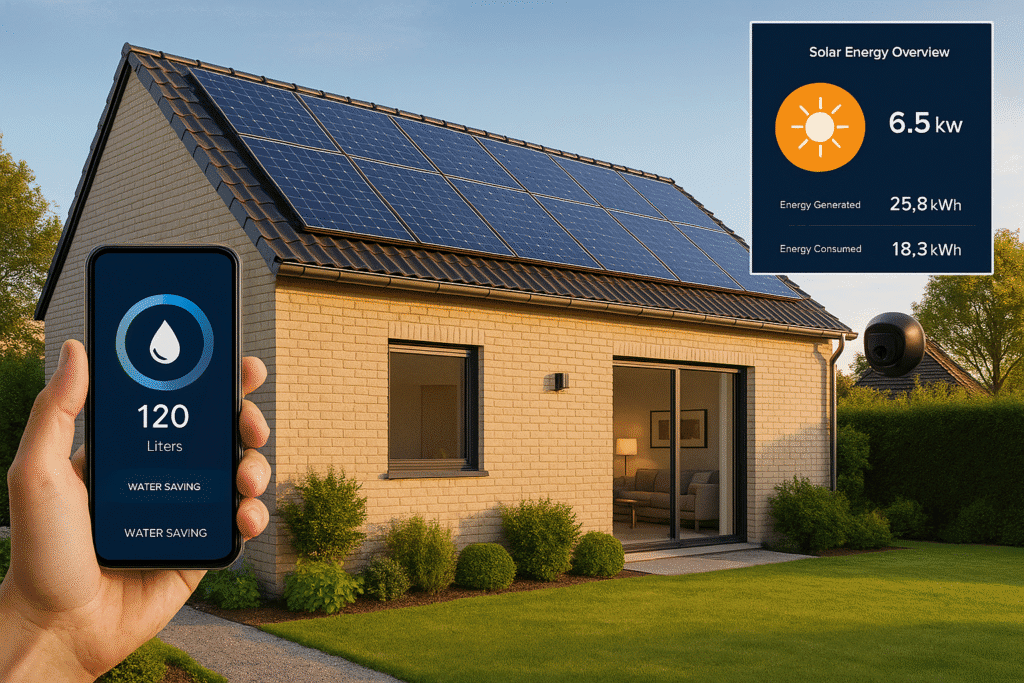
Building the Elite Network: Luxury Real Estate in the Digital Age
Connecting Through Technology-Driven Platforms
The luxury real estate industry has fully embraced digital transformation. In 2025, networking is no longer confined to in-person galas or high-end property expos. Instead, brokers, buyers, and sellers interact on AI-powered platforms, where listings, live tours, and even negotiations occur online in real time.
Luxury property professionals now rely on tools that integrate CRM systems with predictive analytics to better understand client preferences. This allows for hyper-personalised service — suggesting properties not just based on budget, but on lifestyle, taste, and even future goals.
These platforms also bridge the gap between international buyers and remote properties. For example, a buyer in Hong Kong can take a virtual tour of a smart home in Monaco, consult a designer in Paris, and sign the deal with a New York-based lawyer — all within a day. This is the level of sophistication the modern luxury real estate network demands.
Expanding Reach for Premium Real Estate Services
To thrive in this environment, luxury property advisors must go beyond conventional sales tactics. They need to cultivate online reputations, develop tech fluency, and stay ahead of emerging trends. Collaborating with AR/VR developers, data analysts, and cybersecurity firms has become part of the everyday.
Moreover, as global demand for smart luxury homes rises, agencies are setting up multilingual, multi-time-zone support teams. It’s not just about selling a home — it’s about offering an unmatched experience. Those who master this are dominating the high-end property listings space and redefining what it means to be a top-tier real estate professional.
Conclusion: Embracing the Smart Home Lifestyle of 2025
The future of home living is here, and it’s more intelligent, sustainable, and luxurious than ever. From AI-powered assistants to solar-integrated roofing and virtual reality home planning, the innovations transforming homes in 2025 are setting a new standard for premium living.
For those seeking luxury homes for sale or expanding their luxury property investments, understanding these trends isn’t just beneficial — it’s essential. The modern buyer is looking for a seamless fusion of comfort, convenience, and consciousness. And for industry professionals, this means upskilling, adapting, and innovating continuously.
Smart living isn’t just a trend — it’s a lifestyle, a value-add, and a long-term investment. If you’re part of the global luxury estates scene, now’s the time to embrace these innovations and future-proof your property choices and services.
FAQs
- What are the top smart home features in luxury real estate for 2025?
Top features include AI assistants, biometric security, solar integration, automated lighting, and voice-controlled appliances — all designed to improve comfort and efficiency.
- Are smart homes more secure than traditional homes?
Yes, provided they’re set up properly. With biometric locks, facial recognition, and encrypted cloud monitoring, smart homes offer unparalleled security.
- How do smart upgrades affect home valuation?
Smart upgrades can boost resale value by 10–15%, making them highly attractive for long-term investments in luxury real estate.
- Can smart homes be customised for different lifestyles?
Absolutely. From home offices to wellness centres, smart systems can adapt to personal routines, making them ideal for customisation.
- What’s the cost of converting a home into a smart home in 2025?
It varies, but a full smart conversion for a luxury property can range from £25,000 to £150,000, depending on features and scale.
